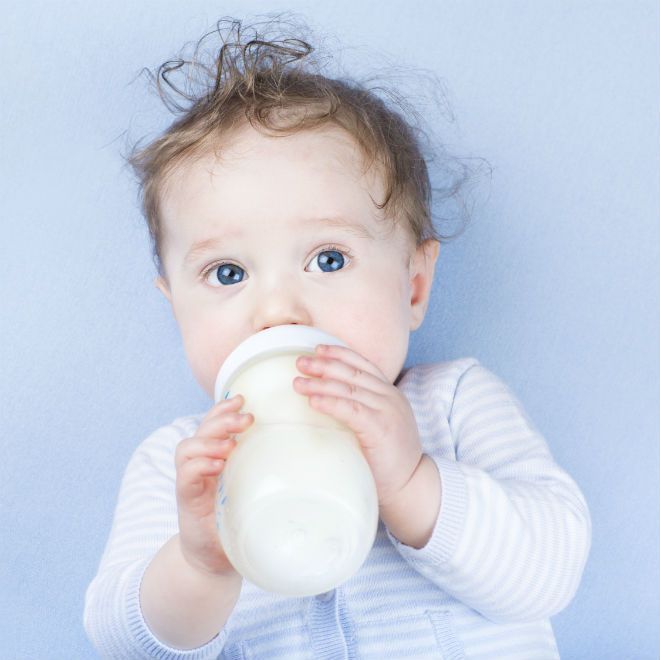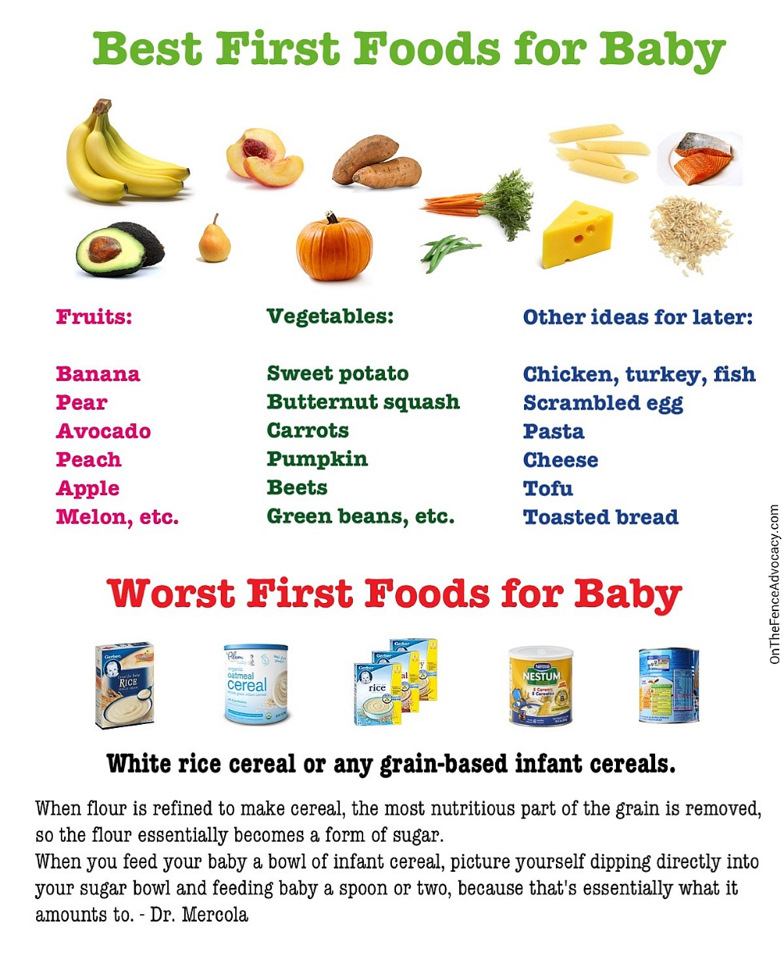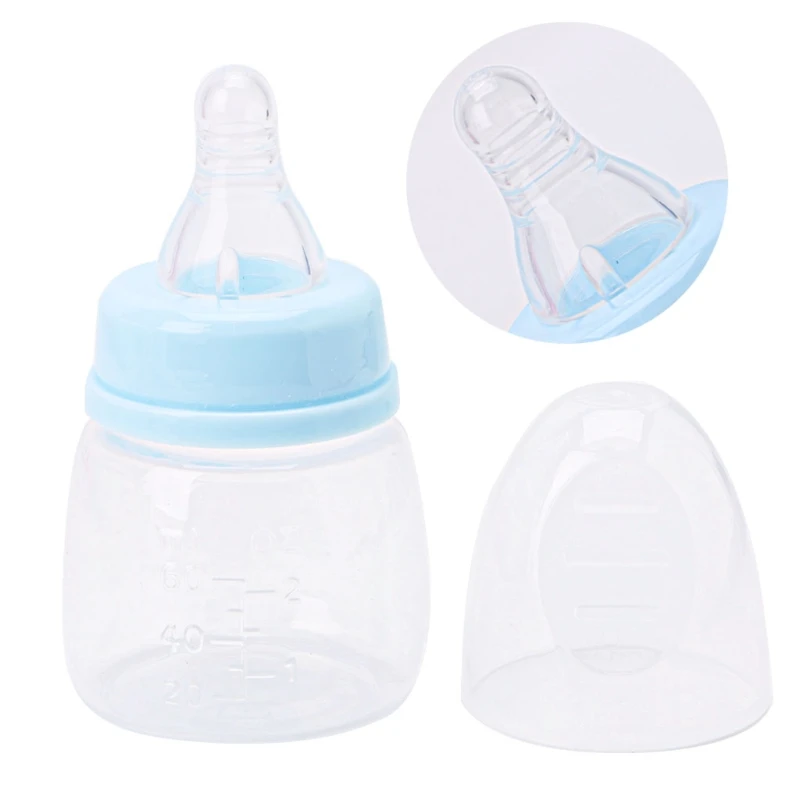My baby is very fussy during feedings
Baby Fusses or Cries During Feeding: Causes & Solutions
Is your baby fussy every time you offer the breast? Do they cry, making it hard to breastfeed?
I’ve been there and know how it can be distressing when your baby is irritable while breastfeeding. It can make you question whether you’re doing something wrong and why the experience isn’t turning out how you imagined.
To help set your mind at ease and offer you some hope, we’ll share everything we know about what makes a baby upset during breastfeeding.
We’ll help you determine the cause of your baby’s fussiness. We’ll also offer our solutions so your breastfeeding sessions can return to being a peaceful experience you both enjoy.
Causes of Baby Crying During Feeding
Half the battle is finding out why your baby is crying and fussing when they should be enjoying their time at the breast. You want to know your baby is getting enough milk and thriving. But it’s hard to be sure when they always latch on and off, crying in between.
Let’s discuss some possible causes.
1. Baby Isn’t Latching On
If your baby is fussing or crying, getting them to latch on to feed can be challenging. Whether overtired, overstimulated, or just plain hungry, a crying baby is unlikely to latch.
The Solution
Begin breastfeeding while your baby is calm and awake, before they get too hungry. Watch for early hunger cues such as rooting, smacking their lips, sucking their hands, sticking their tongue out, or waking from sleeping. Crying is a late sign of hunger.
Swaddling your baby and holding them close, dimming the lights, or moving somewhere peaceful and quiet might also help.
Another thing you can try is squeezing a few drops of milk onto your breast to entice your baby to latch on. The taste and smell of the milk might stimulate them to feed. Changing position or changing breasts can also work sometimes (1).
2.
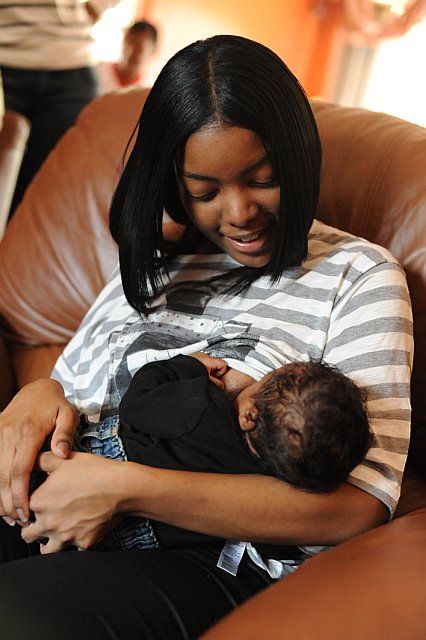 The Milk Flow Is Too Fast or Too Slow
The Milk Flow Is Too Fast or Too SlowPaying attention to when your baby starts to cry might shed some light on the reason.
If your baby is fussier in the morning, it could be that your overly full breasts release too much milk too quickly. Your breasts may have become engorged with milk during the night and your baby can’t cope with this forceful let-down.
Conversely, if they are fussier in the evenings, maybe the milk release is too slow and they get frustrated. They become impatient, waiting for the flow of milk that comes with the let-down, and start crying.
The Solution for Fast Milk Flow
A strong release of milk, or overactive let-down, can make your little one choke, gag, or cough when they’re feeding. They might unlatch from the breast because they don’t like or can’t cope with the fast flow. They could also be gulping a lot of air with the milk and getting gassy, which causes more upset.
These are some of the things you can do to counteract this:
- Express before feeding: Pumping some of your milk before feeding, or expressing by hand, can help slow down the flow.
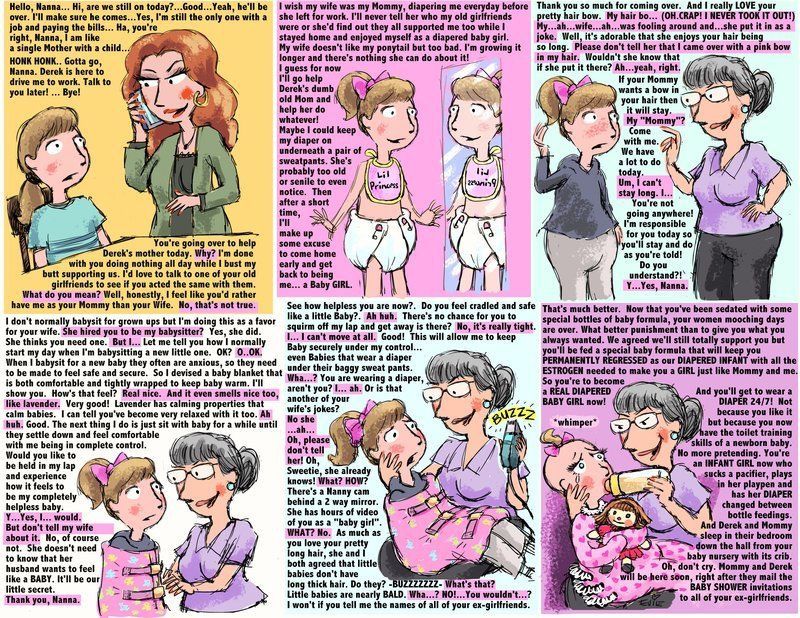 After you feel the first let-down pass and you see the flow is slowing, put your baby to your breast.
After you feel the first let-down pass and you see the flow is slowing, put your baby to your breast. - Lie back when nursing: Adopting a laid-back feeding position with your baby lying on top of you can slow the flow. You could latch your baby on and then lie back against some cushions or pillows. Milk will flow against gravity and won’t pour down your baby’s throat.
- Burp regularly: When your milk is flowing fast, your baby may gulp lots of air while feeding. A gassy baby is a fussy baby, so burp them regularly, during and after the feed.
- Feed one side at a time: Alternate your breasts at each feed. That way, once the flow slows down on the breast your baby is feeding on, they might stop fussing.
- Take a feeding break: If your flow is too much for your little one to cope with, remove them from the breast for a few seconds. Let the excess milk leak onto a towel, and offer the breast again when it stops.
 This might make your baby fussier for a while, but it will pay off in the long run.
This might make your baby fussier for a while, but it will pay off in the long run.
The Solution for Slow Milk Flow
Your baby is hungry, but your milk is not coming quick enough. Just as we can get “hangry” when we need food or drink and aren’t getting it, our babies can too!
Luckily, we have some things you can try to combat a slow flow or delayed let-down:
- Stimulate the flow: Either pumping or hand expressing a little milk before latching can kick-start your let-down reflex. Once you have a steady flow, then you can put your baby to your breast.
- Warm compress: Use a warm towel or compress for a few minutes to stimulate letdown. Place it on your breasts just before each feed.
- Massage: Massaging your breasts before and during a feed can help the milk flow faster.
- Try breast compressions: If you notice your baby is about to start fussing and might unlatch, squeeze your breast.
 This will give your baby a burst of milk, keeping them actively feeding.
This will give your baby a burst of milk, keeping them actively feeding. - Get comfortable: Breastfeeding a fussy baby can be frustrating for you as well. Try and feed in a relaxing position, away from distractions. It’s a perfect time to just concentrate on your baby.
- Make sure your baby gets enough milk: All that fussing and crying might make your little one tired, and they may fall asleep at the breast before they’ve eaten enough. Try and stimulate them to continue feeding by tickling their foot or stroking their cheek. The more your baby feeds, the more milk you will produce.
- Some dos and don’ts: When breastfeeding, avoid smoking and alcohol. Also, try and steer clear of soda and coffee. All these could affect your milk production. Ensure you eat a balanced diet and stay hydrated, too (2).
3.
 Baby Is Going Through a Growth Spurt
Baby Is Going Through a Growth SpurtThere are times during a baby’s first year of life when they go through growth spurts. Their weight and length will increase, as will their head circumference.
Your baby may want to feed more often during a growth spurt and can become fussy. It’s not uncommon for a baby to suddenly feed up to 18 times in 24 hours.
While one does not necessarily lead to the other, it makes sense that a growth spurt and sudden, frequent feeding go hand in hand. Your baby will need more milk to support the growth spurt, and nursing more will naturally boost your supply.
During this time, babies can also become fussier than usual. They might appear unsettled and clingy, and they may not sleep as well as usual.
Growth spurts generally happen several times during the first year. These are the ages when they are likely to occur:
- Two weeks old.
- Three weeks old.
- Six weeks old.
- Three months old.
- Six months old.

Not all babies will follow this timetable; some might have more growth spurts or they may be at different times. For some babies, there might be no change in their behavior when they have a growth spurt.
The Solution
During this time, follow your baby’s lead. Respond to their needs, whether it’s more feeds, extra cuddles, or just quiet time and a nap.
Your baby might get fussy if you aren’t producing as much milk as they want. It can take a day or so for your supply to catch up with the demand. The more you let your baby feed, the more milk your breasts will produce.
Your baby may seem hungry after normal feeding time, so don’t be afraid to nurse again. Keep yourself feeling good during this time by staying hydrated and eating balanced meals. Remember, you are not Superwoman; let family and friends help with chores and shopping while you spend time with your baby.
4. Baby Is Going Through a Developmental Stage
Your baby is constantly developing mentally and learning new skills as they go along. It can be a bit overwhelming and confusing for them, and there might be weeks when they are fussier than usual. Sometimes called the “Wonder Weeks,” it can explain mood changes in your baby (3).
It can be a bit overwhelming and confusing for them, and there might be weeks when they are fussier than usual. Sometimes called the “Wonder Weeks,” it can explain mood changes in your baby (3).
You might find that during these periods, your baby becomes more curious and distracted while feeding. They might want to feed more or, conversely, not stay latched on long enough for a good feed. They can be cranky and fussy and cry a lot when you’re trying to breastfeed.
The good news is that these periods generally only last a few days before your baby returns to normal behavioral patterns.
Not all babies will fit into the pattern of wonder weeks and develop at different times.
The Solution
Feed your baby in a quiet room where there are likely to be fewer distractions. There’s nothing worse than having a situation where your little one latches on, then hears their dad or sees the dog and stops feeding (or worse yet, turns their head with your nipple still in their mouth!).
Trying to get your baby to pay attention can make them fussier and be a constant battle.
You might also find that your baby is fussier and wants to feed more often during these periods. Again, take your cue from them, and give them the extra time and attention they need.
5. Baby Needs to Burp
Babies often fuss, cry, or pull away from the breast when they need to burp. A fast flow of milk can exacerbate this. They can also swallow more air when they’re fussy or gulp down milk faster than usual if they’re over-hungry.
The Solution
Breastfed babies tend not to need burping as often as bottle-fed ones. However, there are times when gas can make them uncomfortable and they need to get it out.
If your baby is fussing, stop the feed and try and burp them. If you let them carry on feeding while they’re crying, then they can take in more air and make the problem worse. Eventually, it can end up with them spitting up.
It’s a good idea to burp your little one mid-feed, even if they don’t appear to be in too much discomfort.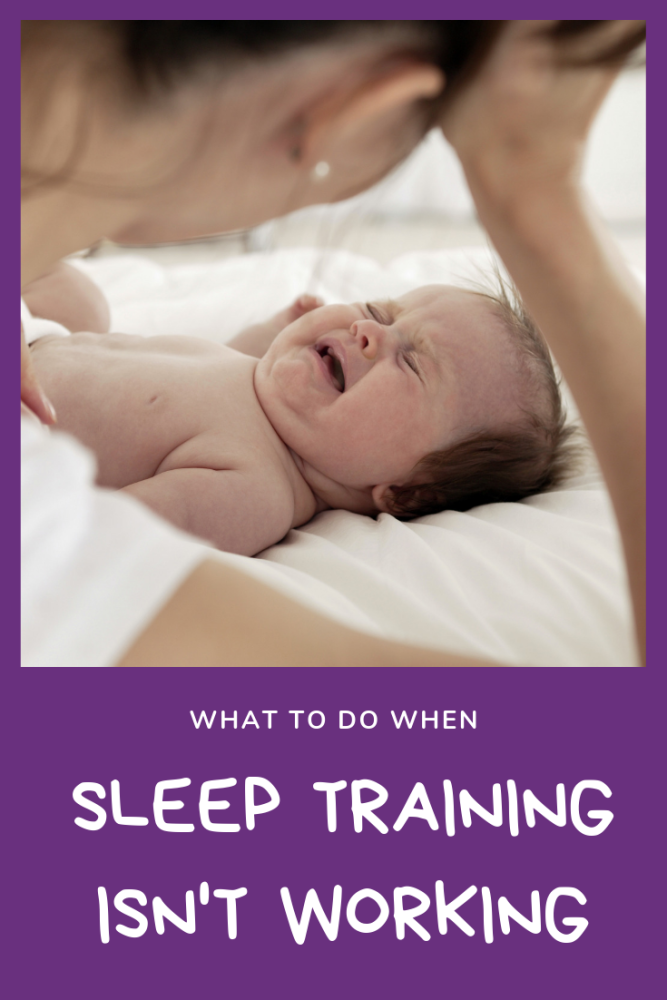 Try to do it when switching breasts or when your baby latches off the nipple.
Try to do it when switching breasts or when your baby latches off the nipple.
Other Reasons for Crying During Breastfeeding
We’ve looked at some of the main reasons your baby might cry while breastfeeding. There are a few other things that can cause this, including:
- Baby prefers one side: Your milk supply might be better on one breast than the other. This may be apparent if your baby only fusses when fed on one side.
- Teething: This can be a painful and uncomfortable time for your baby, and they might fuss more when feeding. You might first realize it’s happening when they clamp down on your nipple and you feel the teeth through the gums. I’m all too familiar with that pain! But trust me, your baby isn’t trying to hurt you; they just want to relieve their pain (4).
- Baby has eaten enough: If your little one starts fussing toward the end of a feed, this might be a sign they’ve had enough.
 Try offering the breast again a few times. If they don’t want it, move on. If you have ruled out any other causes for their crying, their little tummy might be full.
Try offering the breast again a few times. If they don’t want it, move on. If you have ruled out any other causes for their crying, their little tummy might be full. - Baby wants to be pacified: Your little one might be full but still wants to suckle. However, it can be frustrating for them when milk is still flowing. This could be an excellent time to offer a pacifier for them to suckle.
- Thrush: This fungal infection can affect your nipples or a baby’s mouth. If your baby has oral thrush, feeding will be uncomfortable, and they can get fussy. If you suspect this, contact your health care provider (5).
- Baby has a cold: Trying to feed and breathe through a stuffy nose simultaneously can be challenging for a little one. They will become fussy and break away from the breast a lot. Use a nasal aspirator to try to clear their nose, or ask your pediatrician for advice.
- Food sensitivity or allergy: While you might enjoy eating spicy food for dinner, your baby may not.
 The flavor of the food you eat comes through in your milk, and your little one might not always like the taste or the smell. You might notice they are fussier when you have consumed certain foods they don’t like or are allergic to (6).
The flavor of the food you eat comes through in your milk, and your little one might not always like the taste or the smell. You might notice they are fussier when you have consumed certain foods they don’t like or are allergic to (6). - Reflux: Although it’s not very common in breastfed babies, sometimes food comes back up from a baby’s stomach. This can make them cry and feel uncomfortable when feeding (7). Speak with your baby’s doctor if you suspect this is causing your baby to be fussy or cry during breastfeeding.
Feedback: Was This Article Helpful?
Thank You For Your Feedback!
Thank You For Your Feedback!
What Did You Like?
What Went Wrong?
My baby fusses or cries when breastfeeding
By Kelly Bonyata, BS, IBCLC
© Lsantilli - Fotolia.com
Some babies will fuss, cry or pull off the breast during breastfeeding.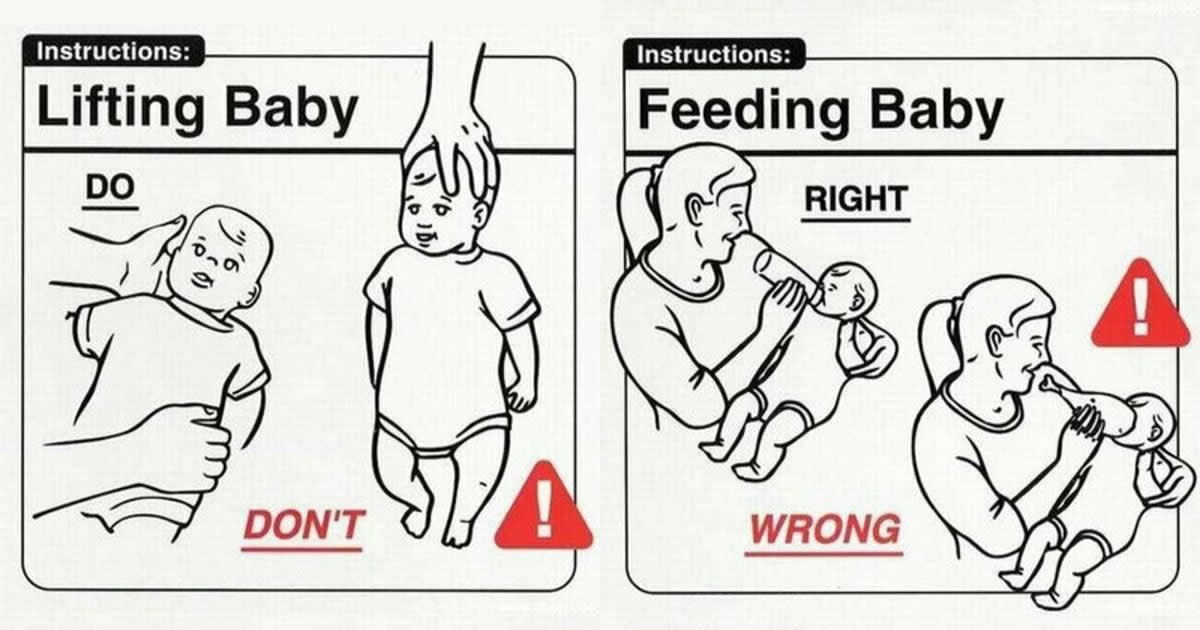 There are a number of reasons why this might be happening. It’s pretty common to see this type of behavior at around 6-8 weeks, though it can occur at any time. If your baby is generally fussy (not just when nursing) see My baby is fussy! Is something wrong?
There are a number of reasons why this might be happening. It’s pretty common to see this type of behavior at around 6-8 weeks, though it can occur at any time. If your baby is generally fussy (not just when nursing) see My baby is fussy! Is something wrong?
Determining the problem
Here are some of the problem-solving steps I go through when my baby is fussy at the breast or a mother asks me why her baby is fussing while breastfeeding:
.
How old is baby? Most babies go through growth spurts during the first few days at home and around 7-10 days, 2-3 weeks, 4-6 weeks, 3 months, 4 months, 6 months, 9 months, etc. Many babies are fussy during growth spurts.
Is baby working on anything new developmentally? Babies who are starting to notice the world around them can be notoriously distractible. Any kind of new developmental step that baby is working on can affect nursing temporarily, whether it be fussy nursing behavior or simply more frequent nursing.
When is baby fussing? To figure out the cause it’s helpful to pay attention to when the fussy behavior happens, both during the nursing session and during the day.
If baby is fussy right when your milk is letting down (or immediately after), there’s a good chance that the fussy nursing is related to a fast let-down. If baby is fussy before let-down, or a few minutes into nursing (and a while after let-down), then baby may be impatient for the fast flow of milk that comes with let-down. Fussing at the end of a nursing session (or what seems to be the end) may mean that baby needs to burp, or is ready to finish nursing, or just wants to suck (and doesn’t want to deal with a new let-down at this point), or wants to continue nursing on the other side or with a faster flow of milk.
If the fussy behavior is mainly in the mornings, it might be due to a faster than usual let-down if baby has just had a longer sleep period and mom’s breasts are fuller than usual. If baby is fussier during evening nursings, it may be due to the normal fussy time that most babies have during the evening. Although most babies don’t react to foods that mom eats, some do. If you eat a particular food at about the same time each day (or most days) and baby has a regular time where she fusses during nursing, try not eating that food for a week or two to see if things improve.
If baby is fussier during evening nursings, it may be due to the normal fussy time that most babies have during the evening. Although most babies don’t react to foods that mom eats, some do. If you eat a particular food at about the same time each day (or most days) and baby has a regular time where she fusses during nursing, try not eating that food for a week or two to see if things improve.
Does fussing occur on both sides equally or only on one side? Most moms have a faster let-down and/or a more abundant milk supply on one side than the other, so if your baby fusses more on one side, it may be due to these differences.
What else is going on with baby? Is she sick or teething? Is something new or different going on in her environment? Has she started solids or is she trying a new food? Is she exhibiting other symptoms besides the fussy nursing?
Below are discussions of some of the different things that can lead to fussy nursing behavior. Keep in mind that the problem may also be a combination of several things.
Keep in mind that the problem may also be a combination of several things.
Does baby need to burp?
Many babies will cry, fuss, pull off the breast, etc. if they need to burp. Try to burp between breasts and after a feeding, but don’t worry if baby does not burp and is content. Breastfed babies overall don’t take in as much air during a feeding as bottle-fed babies do, so usually don’t need to burp as often. If baby has been crying before she nurses, or is so hungry that she nurses “frantically” or if mom has a fast let-down, baby could be taking in more air and may need to be burped more often.
Burping is usually only necessary during the first few months, though it may extend longer. Once your baby is moving more freely, she will be able to relieve the gastric gas herself. This usually will occur between the 4th and 6th month, but may be shorter in some children and longer in others.
If baby has a hard time burping, try burping more often during a feeding. The best burping position is one that applies firm pressure to the baby’s tummy. Placing baby over the shoulder way up so that there is pressure on baby’s abdomen often works well. Walking around while doing this might distract her long enough to get a good burp. You may even want to lie baby down on her stomach and burp her that way.
The best burping position is one that applies firm pressure to the baby’s tummy. Placing baby over the shoulder way up so that there is pressure on baby’s abdomen often works well. Walking around while doing this might distract her long enough to get a good burp. You may even want to lie baby down on her stomach and burp her that way.
Growth spurt
Babies often pull off and fuss during growth spurts. Most babies go through growth spurts, sometimes called frequency days, during the first few days at home and around 7-10 days, 2-3 weeks, 4-6 weeks, 3 months, 4 months, 6 months and 9 months (more or less). More growth spurt information in this link.
Distractible baby
If baby seems to be pulling off the breast at any distraction (real or imaginary), then see The Distractible Baby.
Forceful let-down
Some babies will pull off the breast soon after let-down if mom has a forceful let-down. Baby may be frustrated by the too-fast flow of milk with let-down. A too-forceful let-down can also cause excessive gas or spitting up/vomiting. There is more information here on symptoms of and how to deal with a fast let-down reflex.
A too-forceful let-down can also cause excessive gas or spitting up/vomiting. There is more information here on symptoms of and how to deal with a fast let-down reflex.
Slow let-down
Some babies get very impatient if mom has a slow let-down. There is more information here on speeding up a slow let-down reflex.
Baby wants a faster milk flow
Even very young babies can be quick to notice that pulling off, kneading the breast, etc. can cause an additional let-down, and can facilitate a faster, easier milk flow. Some babies become impatient with the slower milk flow following the initial fast flow at let-down. This may or may not be related to a slow let-down.
When a feeding begins at the breast there are drops of milk. Then when the initial let-down occurs (several seconds to a minute into the feeding), the milk flow speeds up quite a bit. At that time it may drip very quickly, squirt, or even spray. Some minutes later it slows again and the baby must continue to suck vigorously in order to elicit further let-downs.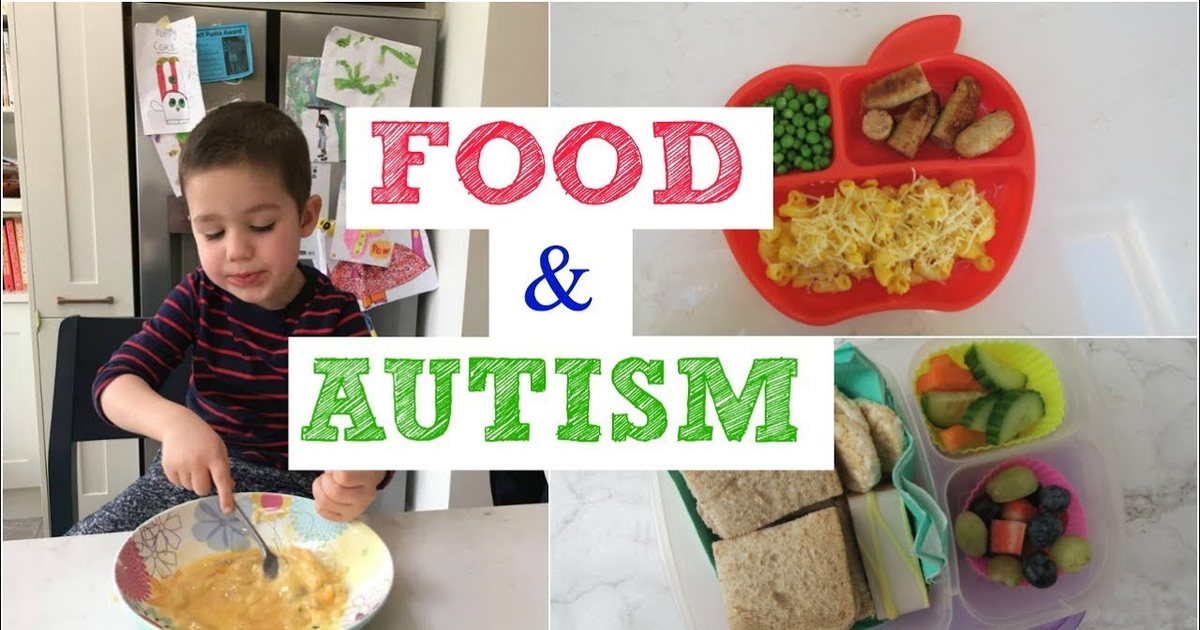 This pattern can continue through successive, multiple let-downs as long as the baby is continuing to nurse vigorously. Eventually, baby will learn that the flow will pick back up again if she’ll only continue to vigorously suck/swallow.
This pattern can continue through successive, multiple let-downs as long as the baby is continuing to nurse vigorously. Eventually, baby will learn that the flow will pick back up again if she’ll only continue to vigorously suck/swallow.
With bottle feeding, the flow is instant and continuous. The baby is required to work very little. Once a baby has had a bottle, especially a lot of bottles, she may begin to prefer the ease of bottle-feeding over the work of breastfeeding. She may become frustrated at the breast after the first let-down occurs and the flow of milk begins to slow.
If baby is getting bottles you might consider putting them away, at least for a while. When you must use a bottle, only use a newborn nipple for as long as baby will tolerate it so that she never gets a really fast flow of milk from the bottle, but has to work a little more to get the milk.
Sometimes babies of moms with oversupply or fast let-down will also get very used to the fast flow and object when it normally slows somewhere between 3 weeks to 3 months.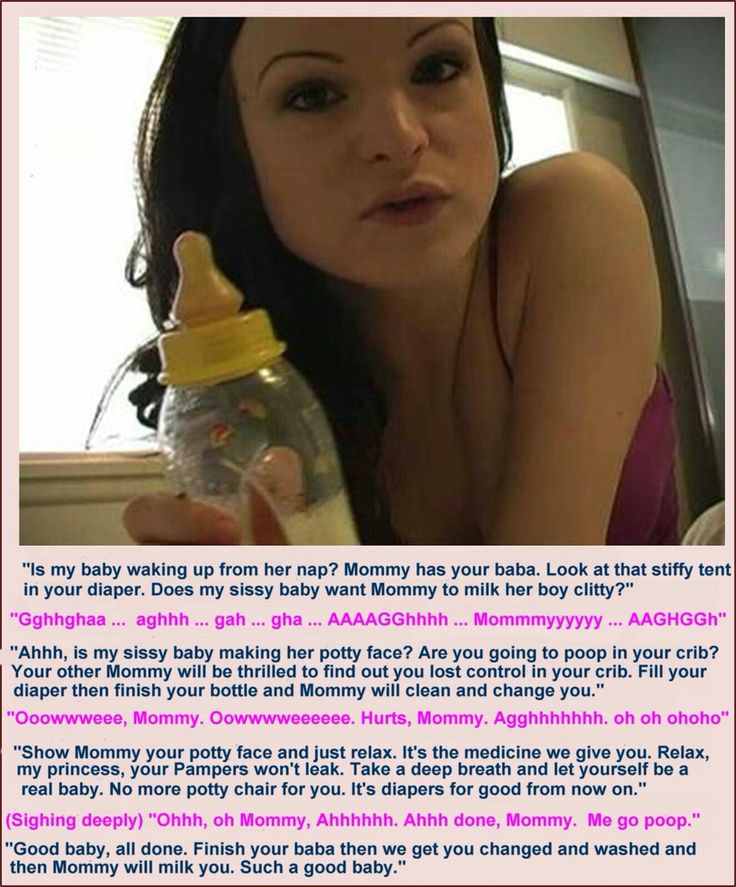
It can be helpful to do some breast compression when this fussiness starts or right before you expect it to. This will help speed up the milk flow again. Once compression stops helping, try switching baby to the other side when she begins to fuss and back and forth again (after using compression) as you need to.
Baby is done nursing for the moment
If baby is fussing after she’s been nursing for a while, and you’ve ruled out other causes, she may be in the process of changing her nursing pattern. Babies become very efficient at the breast with growth and maturity. They can milk the breast in a lot less time per feeding session than they required before. Baby’s frustration may just be a sign that she’s finished and wants to move on.
On a similar note, an occasional baby will just want to suck at the end of a nursing session and the flow of milk with let-down frustrates her. You might see if offering her a finger or pacifier (if baby is older than 4-6 weeks) to suck on during these times seems to help.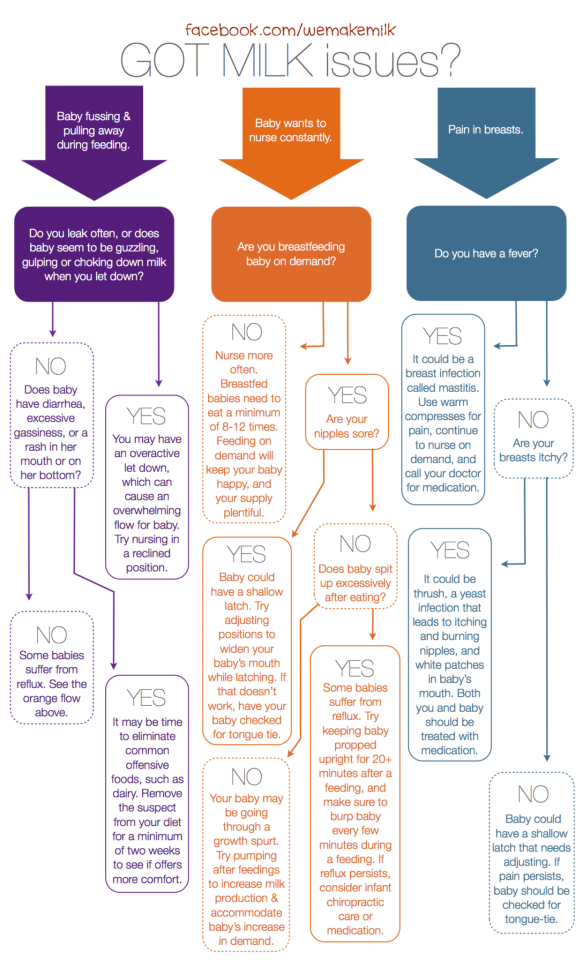
Baby prefers one side
Sometimes babies will refuse or fuss at a breast when the let-down is slower or too forceful, or the supply a bit lower. They in turn will prefer the side which lets down more/less quickly and in which the supply is more bountiful. See also: Lopsided! What can I do?
Fussy in the evening
Many young babies tend to pull off and fuss at the breast in the evening. See the article Cluster Feeding and Fussy Evenings.
Teething
Teething can cause fussy nursing behavior, as some babies experience gum discomfort with sucking. Baby might start to nurse, but then pull off and cry or fuss and not want to nurse anymore. See Teething for more information and tips.
Thrush
Frequent pulling off the breast can be a symptom of thrush.
Stuffy nose
A stuffy nose can cause fussy nursing behavior. If your baby has a stuffy nose and is having a hard time breathing and nursing at the same time, see colds & congestion.
Allergy or food sensitivity
Some babies with allergies or food sensitivities exhibit fussy nursing behavior. Often when there is a sensitivity to something in mom’s diet, baby will come to the breast hungry but when she tastes/smells something in the milk that will cause her GI distress, she pulls off, bats her head back and forth, etc. Sensitivities to foods in mom’s diet are rare. If this is the problem, you will most likely notice other symptoms, such as excessive spitting up or vomiting, colic, diarrhea, rash, persistent congestion or runny nose, or excessive gas. More information on food sensitivities in babies and links to more allergy information can be found in my article Dairy and other Food Sensitivities in Breastfed Babies.
Low milk supply
Low milk supply can cause baby to be fussy at the breast. If you feel that your milk supply may be low, see this page for more info: Increasing low milk supply.
Reflux
Reflux can result in baby being fussy at the breast.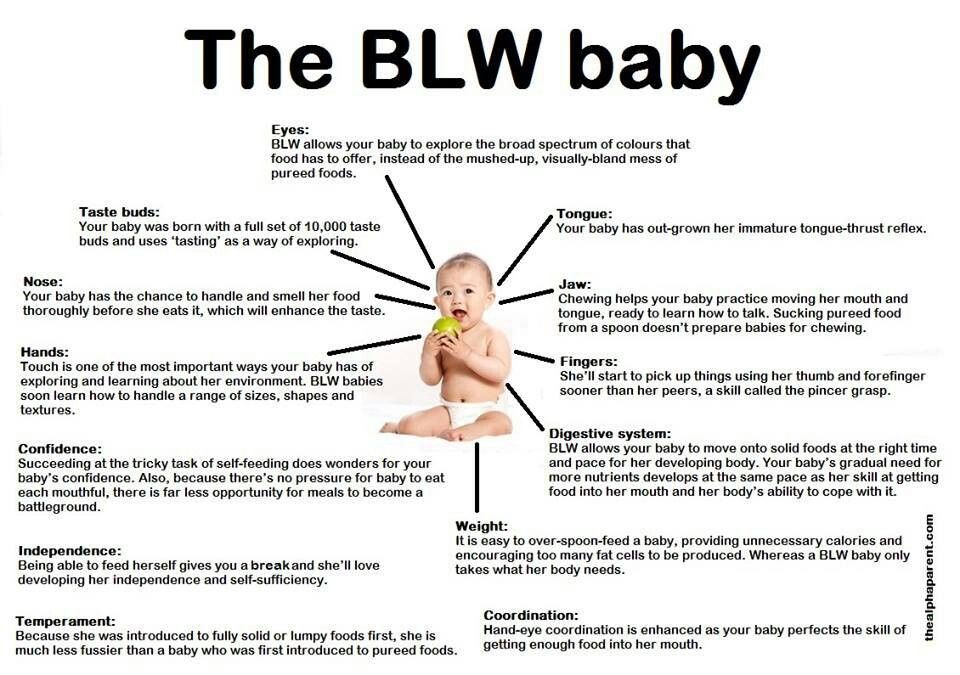 See Reflux and Breastfeeding for more information.
See Reflux and Breastfeeding for more information.
Tongue-Tie
Tongue-Tie can result in baby being fussy at the breast. See Breastfeeding a Baby with Tongue-Tie (Resources) for more information.
Active or hyperactive?
This question is often asked by a pediatrician to mothers. And sometimes it is not easy to answer it.
“Fidget”, “perpetual motion machine”, “hurricane”… What kind of definitions do parents not hear about their overly active child. In infancy, the baby fell out of the stroller more than once, later he broke out the bars of the crib in order to get out of it without hindrance. At the age of four, a little mischievous person is not able to finish listening to a fairy tale, and to captivate him with a quiet game for at least ten minutes is a difficult task. nine0005
Is it worth worrying if your baby is full of inexhaustible energy, and you do not always find a "common language" with him? Let's talk about this with the pediatric neurologist of the OKDC, Nadezhda Leonidovna Kim.
From medical history to health history
Not every excited and inattentive prankster should be classified as a child with a hyperkinetic disorder. If a child's energy is overflowing, he becomes naughty and stubborn, often angry - this does not mean that he is sick. nine0005
Agree, every person (and children are no exception) has moments of anger from time to time. How many children do not want to go to bed or indulge in the supermarket! A noisy baby full of energy from early morning is a reason for joy, not anxiety.
— But there are probably also signs that clearly speak of behavioral deviations?
Usually, signs of attention deficit hyperactivity disorder in a child are detected at the age of two or three years. However, often parents seek medical help only when the baby goes to school. It is here that problems appear, which are becoming increasingly difficult to deal with. First of all it is:
- restlessness, restlessness, restlessness;
- emotional instability, impulsivity;
- ignoring the rules of conduct;
- difficulties with the organization of activities;
- forgetfulness and tendency to lose things;
- sleep problems.
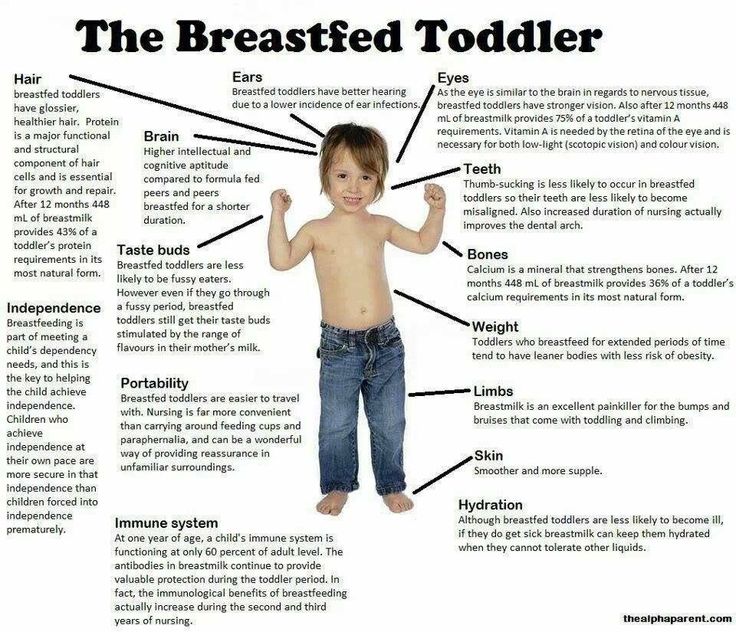
— What are the reasons for such violations?
To date, the main cause of hyperkinetic disorder is considered to be a genetic predisposition: about 30% of parents of children with hyperactivity syndrome suffered from the same ailment. nine0041 In some cases, intrauterine development disorders become the cause of a child's hyperactivity. If during pregnancy the expectant mother had toxicosis or high blood pressure, and the baby was diagnosed with intrauterine asphyxia, the risk of developing the disease increases at least three times. In addition, rapid or, conversely, prolonged labor, the use of nicotine or alcohol by the mother during pregnancy or breastfeeding. can also cause child hyperactivity disorder. Among such causes are chronic pathology, otitis media and somatic diseases, frequent colds, and the use of potent drugs under the age of 1 year. Head injuries and falls during infancy can also affect the nervous system. nine0041 Your baby needs love and care.
— What should mothers and fathers do if they are faced with a similar diagnosis?
Many parents do not consider it necessary to deal with hyperactivity disorder in children, attributing bad behavior to a difficult age. However, in the future, the disease turns into much more serious problems - poor school performance, frequent criticism from teachers and friends, nervous breakdowns and constant stress, resentment, decreased immunity, social isolation. nine0005
Any task tires such a child very quickly, just a couple of minutes after the start. It is almost impossible to focus on learning a new subject. Sitting down for homework in the language, the child opens a math notebook and does not notice that he is writing the text on a sheet in a cage. He forgets to write down information in a diary, may forget the textbook and notebooks on the desk or not hear the request addressed to him, avoids tasks that require attention and concentration.
nine0002 These children usually have a very poor memory. Trying to learn something by heart, a child can repeat a phrase twenty times and not reproduce it after a minute. This happens due to constant distractibility: children mechanically pronounce the words they are learning, but mentally follow the crawling fly on the wall or listen to the sounds from the street.
Trying to learn something by heart, a child can repeat a phrase twenty times and not reproduce it after a minute. This happens due to constant distractibility: children mechanically pronounce the words they are learning, but mentally follow the crawling fly on the wall or listen to the sounds from the street. Therefore, it is necessary to pay attention to the peculiarities of your child's behavior as early as possible, seek advice from an experienced specialist and conduct a comprehensive corrective therapy. nine0005
The doctor's task is to collect information and conduct a comprehensive examination to exclude other possible causes of such behavior of the child - a sudden change in the family, such as parental divorce, undiagnosed epilepsy, depression, hearing loss, vision loss, and other somatic diseases that affect brain function.
- What specific advice can parents give to make it easier to communicate with such a child?
— Show enough firmness and consistency in education.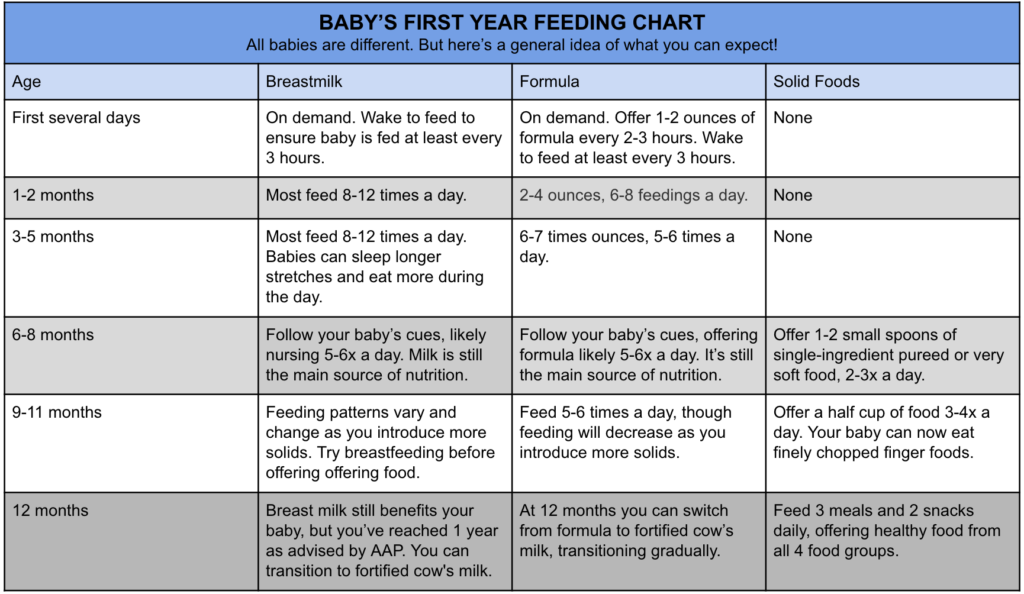 Watch your speech, always speak slowly, in a calm voice. Praise him in every case when he deserves it, emphasize even minor successes. Build relationships with your child on mutual understanding and trust. Don't argue in front of your child. Protect the child from overwork, because. it leads to a decrease in self-control and an increase in motor activity. Do not let him sit at the TV or computer for a long time. nine0005
Watch your speech, always speak slowly, in a calm voice. Praise him in every case when he deserves it, emphasize even minor successes. Build relationships with your child on mutual understanding and trust. Don't argue in front of your child. Protect the child from overwork, because. it leads to a decrease in self-control and an increase in motor activity. Do not let him sit at the TV or computer for a long time. nine0005
Make sure your child gets enough sleep. Avoid large crowds as much as possible. Staying in shops, markets and large entertainment centers has an excessively exciting effect on the child.
Share information
Social buttons for Joomla
Hyperactivity in a child | Children's City Hospital
nine0002 There is a playground where my 4-year-old daughter and I go to play, one boy, Alyosha. He's 5. To say that he is very active is an understatement. Just for the almost 2 years that we have been going there, I have never seen him calmly play in the sandbox, swing on a swing or just sit next to his mother for at least 2 minutes. This is a hurricane, a whirlwind, a tornado - such comparisons can be made. He doesn't walk, he runs. And always. Spinning, spinning, stumbling, falling, pushing, throwing, with anything, in the end, he is exhausted, and departs home with his mother in hysterics ...
This is a hurricane, a whirlwind, a tornado - such comparisons can be made. He doesn't walk, he runs. And always. Spinning, spinning, stumbling, falling, pushing, throwing, with anything, in the end, he is exhausted, and departs home with his mother in hysterics ...
When we see Alyosha on the playground, we try to wait for him to leave. Other mothers said among themselves that Alyosha had already been taken to a psychiatrist and diagnosed with hyperactivity...
What is Attention Deficit Hyperactivity Disorder?
There are generally two different options. This, in fact, is a painful condition in which the help of a specialist is necessary, and features of the character, temperament and upbringing of the child.
The disease is called Attention Deficit Hyperactivity Disorder (ADHD) and has distinct features:
- unable to maintain attention during play and tasks;
- often "does not hear" what is said to him, and has no hearing problems;
- does not finish what he started;
- often loses things that are needed every day - toys, school supplies;
- finds it difficult to do anything on his own; easily distracted;
- forgetful in familiar everyday situations;
- constantly on the move, even while eating; nine0023 always does everything with noise; makes aimless movements;
- talks a lot; answers questions without hesitation;
- interferes with others, interferes with games and conversations;
- can't wait, stand in line.

If there are more than six of these signs and they are observed for six or more months in a row, it is highly likely that this is not a character and temperament, but a painful condition that requires the help of specialists.
In addition, children with ADHD simply cannot control themselves, cannot stop and calm down on their own, do not respond to prohibitions and remarks, are often impulsive and aggressive, do not finish anything, are quickly distracted and exhausted, speak quickly and a lot , ask millions of questions, but do not listen to the answers, are clumsy (dropping, breaking things), sleep poorly, they often have intestinal disorders and enuresis. nine0005
How to distinguish a simply active child from a hyperactive one
There is a simple way: if a child behaves the same EVERYWHERE - both at home, and at a party, and on the street, and in an unfamiliar environment, and in a children's team - this requires the help of specialists ( child neurologist, psychologist, psychiatrist).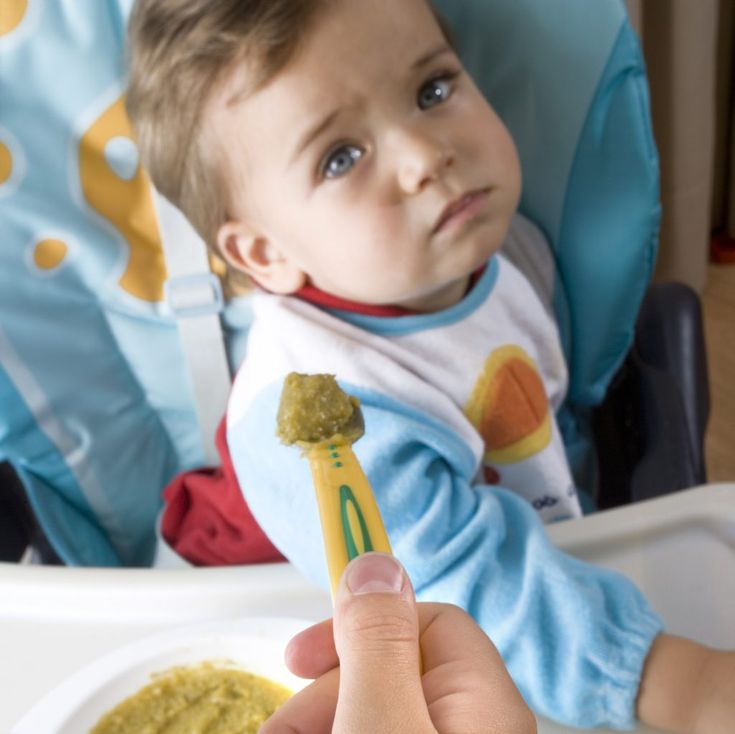 Consult, then either calm down and properly educate (more on this below), or confirm your doubts and be treated according to the recommendations of doctors.
Consult, then either calm down and properly educate (more on this below), or confirm your doubts and be treated according to the recommendations of doctors.
If a child is only noisy, restless and active at home, and sits “like a mouse” at a party, these are rather features of the character of such a child. This is exactly what happened to me with my child. The neurologist consulted, said that this is not a disease, but such a temperament; psychologist gave advice.
Why does this condition occur? Is it related to upbringing?
These are the questions that all parents worry about when a child is diagnosed. The number of children with ADHD, unfortunately, is growing every year. And now, according to various experts, they are from 3 to 10%. Boys among them are five times more than girls. nine0005
The causes of this condition are not fully known, but:
- environmental degradation;
- infectious diseases of the mother during pregnancy;
- pathological childbirth;
- birth injuries
. .. ... play an important role in the development of this condition.
.. ... play an important role in the development of this condition.
It is not connected with insufficiently tough upbringing (as some parents think, the child is not just “indulging” and “not obeying”), tougher penalties only worsen the situation with behavior. nine0005
“If you scold me and say that I am bad, then you will know how bad I can be!” - this is the result.
What is the main problem of children with ADHD and what to do about it?
The main problem is that such children cannot adapt to society. Due to their impulsiveness, uncontrolled aggression, such children ignore the generally accepted rules of behavior, harming themselves and others. Which inevitably leads to problems. With development, study, communication.
And one more thing. According to statistics, 80% of people who are in prison were hyperactive children. Think about it and do not delay treatment. It won't go away on its own!
How can parents help such a child?
Dealing with Hyperactivity in a Child I have a very active child myself. This, thank God, is just such a temperament, but it is also suitable for children diagnosed with ADHD. And the psychologist taught us how to properly handle it, in order to live a little more ourselves.
This, thank God, is just such a temperament, but it is also suitable for children diagnosed with ADHD. And the psychologist taught us how to properly handle it, in order to live a little more ourselves.
- Try to establish contact with the child before demanding anything from the child. Touch, hold hands.
- Look into his eyes and then talk to him. Why do it? Because when a child is busy with something, passionate, playing - he is all there, in his experiences, and does not hear you. It really helps - I take my daughter by the hand, look into her eyes, tell her what I need her to do, and in most cases it helps.
- Set permanent rules. Stick to it strictly. The rules for the child should be clear and simple. For example, if today you can’t eat sweets before meals, touch someone else’s dog, jump from a swing, be rude to your grandmother, open a gas valve, then tomorrow it’s impossible. nine0024
- It is important to follow the sequence of actions, break complex tasks into several simple ones - this will make it easier for the child to cope.
How do I apply it? I say: “Let's clean the children's room. First we make the bed. To do this, we straighten the sheets, pillows, cover with a bedspread. Then we collect toys. Cars - in a box, dolls - on a doll table, cubes - in a box. And so on, until we remove everything.
- Always observe the regime in everything. Literally by the hour, get up, eat, walk, go to bed. Always, any day of the week. It really helps. And adults too. nine0024
- Praise. But wisely. Something done well - praise. Listened - praise. Find something that your child is best at and praise for it. My daughter, for example, loves to help prepare her dad's breakfast. And literally melts with pleasure when I praise her for it. And the mood is good for half a day.
- Try to spend excess energy. Excess energy goes away - the child becomes calmer. Checked on myself. It is important not just to run, but to “put energy in the right direction” - dancing, acrobatics, athletics, swimming pool ...
- If you are going somewhere (travel, guests, shop), prepare in advance.




